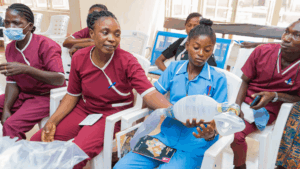A multivalent conjugate vaccine targeting five bacterial strains could help eliminate recurring outbreaks that have killed hundreds of thousands across sub-Saharan Africa’s meningitis belt.

For more than a century, bacterial meningitis has swept through a region of Africa stretching from Senegal to Ethiopia, killing tens of thousands in cyclical epidemics that occur every five to ten years. The disease, caused by various strains of Neisseria meningitidis bacteria, can kill within hours if untreated. One in six patients dies, and survivors often face severe complications including hearing loss, brain damage, and amputations.
The meningitis belt exists due to harsh environmental conditions—harmattan winds carrying Saharan dust damage the delicate linings of people’s noses and throats between November and March, creating entry points for bacteria into the bloodstream. Poverty, overcrowding, malnutrition, and indoor cooking fires further increase vulnerability.
Vaccine Advances
A major breakthrough came in 2010 with MenAfriVac, which effectively eliminated serogroup A meningitis, the leading cause at the time, and saved millions of lives. But other bacterial strains continued causing outbreaks. In 2024, Nigeria’s Yobe State reported 2,948 cases and 72 deaths from a serogroup C outbreak.
Now, a new five-in-one vaccine called Men5CV (also known as MenFive) is being rolled out across the meningitis belt. Developed through a 13-year collaboration between India’s Serum Institute and the Seattle nonprofit PATH, the vaccine protects against serogroups A, C, W, Y, and X—responsible for nearly all epidemic meningitis in sub-Saharan Africa. At just $3 per dose, even the poorest countries should be able to afford it, according to The Telegraph.
The vaccine has already been introduced in Niger and Nigeria, with Mali, Ghana, Burkina Faso, Chad, and Togo planning rollouts in coming months. PATH notes that while MenFive received World Health Organization prequalification in 2023, full introduction across the entire meningitis belt will likely take several years.
To ensure sustainable vaccine access, a second affordable option is in development. A Phase 2/3 study of EuBiologics’ pentavalent meningococcal conjugate vaccine began in September 2024 in Bamako, Mali, with a second site in Banjul, The Gambia, enrolling participants in early 2025, PATH reported. The study will enroll approximately 4,200 participants aged 9 months to 29 years.
EuBiologics, a South Korean pharmaceutical company, is also working to establish local vaccine production in Africa. According to the Seoul Economic Daily, the company plans to transfer vaccine technology to Biovac, a South African pharmaceutical company, by 2025 and obtain export approval from South Korea’s Ministry of Food and Drug Safety by the end of 2027. If successful, Biovac is expected to supply a minimum of 10 million doses locally.
Experts express cautious optimism about eliminating meningococcal meningitis epidemics by the World Health Organization’s 2030 target date. Dr. Michael Head, Senior Research Fellow at the University of Southampton, called Men5CV “a powerful new weapon that, with wider rollout, has the potential to protect millions of vulnerable people,” as quoted in The Telegraph.
Challenges
However, significant challenges remain. Many meningitis belt countries face instability, particularly in the Sahel region, making vaccine delivery difficult. Dr. Head noted that maintaining vaccine uptake relies on healthcare delivery in areas facing conflict, climate difficulties, and remote locations, The Telegraph reported.
Funding cuts pose another threat. The United States has reduced support for Gavi, the vaccine alliance that supplies vaccines to developing countries. Dr. Head warned that “there is a real possibility that future innovative and important research, as we have seen with this new meningitis vaccine, may not be able to happen as the impact of aid cuts becomes clear,” according to The Telegraph.
Despite these obstacles, health experts remain hopeful. Claire Wright, Senior Health Insights Manager at the Meningitis Research Foundation, told The Telegraph, “I think there’s a real possibility of ending meningococcal meningitis epidemics in sub-Saharan Africa. The question isn’t the technology, but whether we will have the funding.”
The stakes are high. PATH reports that the at-risk population in Africa’s meningitis belt is approximately 470 million people across 26 countries. With multiple vaccine options in development and local production capacity being established, the tools to defeat this disease are emerging—if the international community maintains its commitment to getting them where they’re needed most.
This summary is based on the following articles:
- Africa’s ‘meningitis belt’ has killed hundreds of thousands – a new vaccine may turn the tide, by Verity Bowman for The Telegraph
- What’s next for meningitis prevention? More vaccine options, by Katie Regan for PATH
- The RIGHT Foundation and EuBiologics Collaborate to Eradicate Meningococcal Disease in Africa, by Wang Hae-na for the Seoul Economic Daily (서울경제)
Related Articles

Global Relief in Focus: 10 Images that Defined Humanitarian Aid in 2025
2025 was a year filled with conflict, disaster and disease—as well as the work of committed and courageous humanitarians who did everything they could to help. These photos from International Medical Corps highlight the people who made it happen.

Frontline Heroines: Women Leading Nigeria’s Fight Against Polio
In Nigeria’s dusty neighborhoods, female health workers carry cooler boxes filled with oral polio vaccines, navigating settlements, mosques, and churches with one mission: ensuring no child remains vulnerable to a disease that once paralyzed thousands.

Equipping Midwives for Success and Transforming Maternal Health in Nigeria
Dr. Faith Adole’s “Value Her initiative” is transforming maternal healthcare in rural Nigeria, with the help of Direct Relief. The program provides midwife training and essential supplies, reducing mortality rates while empowering local healthcare workers with life-saving skills.



